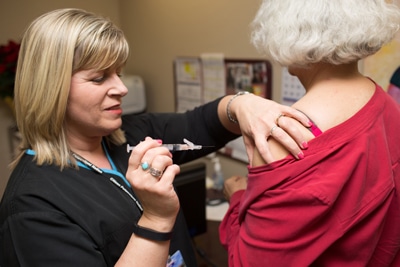Amidst the constant debate over vaccinations, one central point is often overlooked. The need to focus on healthy life choices, whether eating better, exercising more or using preventative medical visits, is often left out of such discussions. While the majority of medical research has time and again proved the efficacy of vaccinations in preventing the spread of communicable diseases, the value of being in good health when flu season strikes cannot be discounted.
The Hownikan spoke with CPN Health Services Nursing Coordinator Amber Curtis and CPN Physical Therapist James Bailey about staying healthy through preventative measures before medicines become necessary. 
What are some ways to be healthy and avoid overusing using medicines?
Bailey: “I wish there was a simple fix in helping most people decrease their pain. The unfortunate truth for most is they have to become an active participant in their treatment plan and help make goals that are obtainable but challenging. There is plenty of research showing how improving eating habits and exercise can have beneficial effects on decreasing pain, improving memory, improving quality of sleep, increasing the immune system, helping heart disease, reducing stress and anxiety, etc.”
Vaccines don’t give full immunization from the flu virus. What are ways people can avoid catching it?
Curtis: “Your first line of defense is always going to be hand washing. The flu can survive on hard surfaces, so keep your desk, door handles and anywhere else that your hand constantly touches clean with antibacterial wipes. Peak time for the flu is late September through March, but there is no such thing as the ‘flu season’ anymore because we see it all year round.”
What are some ways to avoid using over-the-counter medicines to heal?
Bailey: “Pain medications are absolutely beneficial for some patients and they help us in the physical therapy clinic to allow patients to increase their level of function. As with most health professionals, I do not believe pain medication is the solution for most patients with chronic pain. If it was, then chronic pain would be much better controlled in the world.
“One way to help decrease the use of over-the-counter medications is to find an alternative. One of the great benefits of aerobic exercise is our bodies will produce endogenous opioids which act as a natural pain medicine. Just exercising at about 50 percent of max capacity for 10 minutes or more can start the process of your body releasing natural analgesics (pain meds). This is one strategy we utilize and are learning more about to help decrease pain.”
Do you have any suggestions for diabetics who heavily rely on medication?
Curtis: “The biggest way for someone to affect their diabetes positively is to get up and move. It’s a proven fact that when you exercise, you require less insulin. When you rely on insulin too much, you create your own highs and lows of blood sugar levels.
“Eating fewer carbohydrates – which turn to sugar – will also decrease your need to use insulin. Replace bread, pasta and rice by adding more vegetables into your meals. Eating less processed food is another way to live healthier and keep your insulin demands much lower.
“When it comes down to it, the more you move the less you rely on these medications. Thinking that you need more pills, or a different brand of pill or a stronger pill to fix your diabetes won’t help. There isn’t a pill for everything.”
What are your suggestions for working through pain to get healthy?
Bailey: “One of the greatest parts of our job is helping patients to throw out the old adage of ‘no pain, no gain.’ The two cycles I see most in the clinic are first, people who push through pain to finish a task and then have increased pain for days afterwards.
“Next are the people in so much fear of pain that they avoid doing anything that could remotely cause it. They begin to limit most of their daily activities to the point where they barely function.
“We now know the more beneficial way of working through pain is to understand your limits and set obtainable goals without causing a flare up. We teach our patients regularly to respect their limits, but to find them none the less. When they have determined their limits, we ask them to gently nudge into the pain, and then back off as to not cause a flare up. The key is to push our bodies to adapt.
“This approach allows us to slowly increase our ability to perform more of a task before our limit is reached. This approach is called graded exposure and can be used with any task around the home, work duties as well as a general exercise program.”
If you would like to learn more about the offerings of the Citizen Potawatomi Nation Health Services, please visit https://www.potawatomi.org/services/health/clinics or call 405-878-4693.
